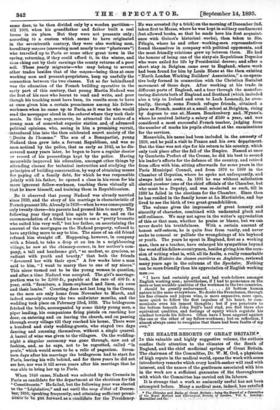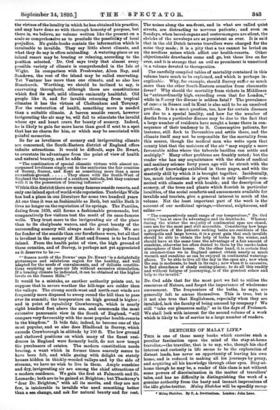THE HEALTH-RESORTS OF GREAT BRITAIN.* IN this valuable and highly
suggestive volume, the authors confine their attention to the climates of the South of England, and the chief medicinal springs of Great Britain. The chairman of the Committee, Dr. W. M. Ord, a physician of high repute in the medical world, opens the work with some introductory remarks which every health-seeker will read with interest, and the names of the gentlemen associated with him in the work are a sufficient guarantee of the thoroughness with which the Committee has carried out its labours.
It is strange that a work so eminently useful has not been attempted before. Many a medical man, indeed, has extolled
• The Climates and Baths of Great Britain being the Report of a Committee of the B:Nal Medical and Chirurgical Society of London. Vol. I. London : Macmillan and Co.
the virtues of the locality in which he has obtained his practice, and may have done so with thorough honesty of purpose, but there is, we believe, no volume written like the present on a scale so comprehensive as to preclude the possibility of local prejudice. No guide-books contain the information which is invaluable to invalids. They say little about climate, and what they do say is often misleading. A watering-place or an inland resort may be bracing or relaxing, according to the position selected. Dr. Ord says truly that almost every possible variety of climate is comprehended in the Isle of Wight. In comparison with Freshwater, Alum Bay, and Sandown, the rest of the island may be called enervating. Yet Ventnor has more than one climate, and so also has Bonchurch. Worthing, we should be inclined to say, is enervating throughout, although there are constitutions which find its soft, mild climate eminently healthful. Old people like it, and for invalids returning from tropical climates it has the virtues of Cheltenham and Torquay. For the restoration of health, something more is needed than a suitable climate. A barren seaside resort, however invigorating the air may be, will fail to stimulate the invalid whose eye and heart crave for beauty of scenery. Indeed, he is likely to gain far more harm than good if sent to a spot that has no charm for him, or which may be associated with painful memories.
So far as loveliness of scenery and invigorating climate are concerned, the South-Eastern district of England offers infinite attractions. It would be difficult, says Dr. Ewart, to overstate its advantages from the point of view of health and natural beauty, and he adds :-
" The combination of special climatic virtues with almost un- surpassed loveliness single out to the sanitarian the fair counties of Surrey, Sussex, and Kent as something more than a mere
recreation-ground They share with the South-West of England the temperature of a southern latitude, but they contrast with it in the possession of bracing influence."
Within this district there are many famous seaside resorts, and only one inland spot of world-wide reputation. Tunbridge Wells has had a place in our literature for some two hundred years At one time it was as fashionable as Bath, but unlike Bath it lives no longer on the reputation of its springs. The Pantiles, dating from 1638, still forms a fashionable promenade, but comparatively few visitors test the merit of its once-famous wells. They trust more to the invigorating air of the place than to its chalybeate waters, and the great beauty of the surrounding scenery will always make it popular. We are far fonder of the seaside than our forefathers were, but all that is loveliest in the scenery of Kent and Sussex is to be found inland. From the health point of view, the high ground of these counties, and of Surrey, is perhaps not yet appreciated as it deserves to be :—
" Sussex north of the Downs' says Dr. Ewart 'is a delightfully picturesque and salubrious region for the healthy, and well adapted for the needs of convalescents, and of delicate constitu- tions requiring an open-air life without excessive stimulation. If a bracing climate be indicated, it can be obtained at the higher levels on the Sussex Hills.' "
It would be a mistake, as another authority points out, to suppose that in severe weather the hill-tops are colder than the valleys. The strong south-west and north-east winds are frequently more disposed to sweep round the hill than to pass over its summit; the temperature on high ground is higher ; and in point of equability Crowborough, which is nearly eight hundred feet above the sea, and commands the most extensive panoramic view in the South of England, "will compare very favourably with the most popular health-resorts in the kingdom." It bids fair, indeed, to become one of the most popular, and so also does Hindhead in Surrey, which exceeds Crowborough in altitude by 100 ft. The low ground and sheltered positions on which many of the finest resi- dences in England were formerly built, do not now tempt the purchasers of estates. The modern constitution needs bracing, a want which in former times scarcely seems to have been felt, and while gazing with delight on stately houses hidden in thickly-wooded valleys and by the side of streams, we have no wish to live in them. Ample sunshine and dry, invigorating air are among the chief attractions of a modern residence. We gain the first at Falmouth and St.
Leonards ; both are to be gained at Brighton; but Thackeray's "dear Dr. Brighton," with all its merits, and they are not few, is intolerable to invalids who need something better than a sea change, and ask for natural beauty and for rest. The noises along the sea-front, and in what are called quiet streets, are distracting to nervous patients ; and even on Sundays, when barrel-organs and costermongers are silent, the shrieks of the newsboys are as persistent as ever. It is said
that in the old Dutch taverns travellers were charged for the noise they made ; it is a pity that a tax cannot be levied on the needless noises which afflict our health-resorts. Other objectionable drawbacks come and go, but these live on for
ever, and it is strange that an evil so prominent is unnoticed in a volume devoted to therapeutics.
The carefully compiled tables of mortality contained in this volume leave much to be explained, and which is perhaps in- explicable. Why, for example, should Surrey suffer so much more than the other South-Eastern counties from rheumatic • fever P Why should the mortality from rickets in Middlesex be "extraordinarily high, exceeding even that for London," while in S-irrey the disease is seldom fatal P The prevalence of canecr in Sussex and in Kent is also said to be an unsolved prob7.em. It is a moot question, too, how far certain diseases are due to a special locality, and how far the number of deaths from a particular disease may be due to the fact that a large number of residents have sought a home there in con- sequence of their tendency to it. Consumptive patients, for instance, still flock to Devonshire and settle there, and the climate itself may not be responsible for the mortality from this source, though the medical men who write upon that county hint that the moisture of the air " may supply a more favourable nidus where the tubercle bacillus can settle and multiply." Many other problems are frankly noted; but the reader who has any acquaintance with the state of medical and sanitary science forty years ago will be struck with the growth of knowledge exhibited in these pages, and with the
masterly skill by which it is brought together. Incidentally, too, much information is given that is only indirectly con- nected with climate and with health; and the description of scenery, of the trees and plants which flourish in particular localities, of the social comforts and amusements available for invalids and tourists, give a general interest to much of the volume. Not the least important part of the work is the
account of our medicinal springs,—thermal, sulphurous, and saline :—
" The comparatively small range of our temperature," Dr. Ord writes, " has at once its advantages and its drawbacks. Whereas during the winter the majority of continental spas are closed, ours are for the most part still accessible. Considering how large a ,proportion of the patients seeking baths are residents of the metropolis and large towns, it is a great gain that such invalids should be able to obtain the help of baths in the winter, and should have at the same time the advantage of a fair amount of sunshine, otherwise too often denied to them by the smoke-laden atmosphere of their homes. On the other hand, it is certain that in summer-time we in England cannot obtain nearly as much warmth and sunshine as can be enjoyed in continental watering- places. To be able to live all the day in the open air ; now when the sun is moderate, to bask in its rays ; now when it is excessive, to find abundance of shady resting-places; to do all this readily and without fatigue of journeying, is of the greatest solace and help to the invalid."
Dr. Ord adds that for the most part we fail to utilise the resources of Nature, and forget the importance of wholesome amusement. The frequenters of the baths, he says, are generally left to amuse themselves. This is true, but is it not also true that Englishmen, especially when they are
invalided, lack the faculty of being amused by company P We still " take our pleasures sadly," as in the days of Froissart.
We shall look with interest for the second volume of a work which is likely to be of service to a large number of readers.



































 Previous page
Previous page